非英语专业专科用
- 格式:ppt
- 大小:182.00 KB
- 文档页数:37
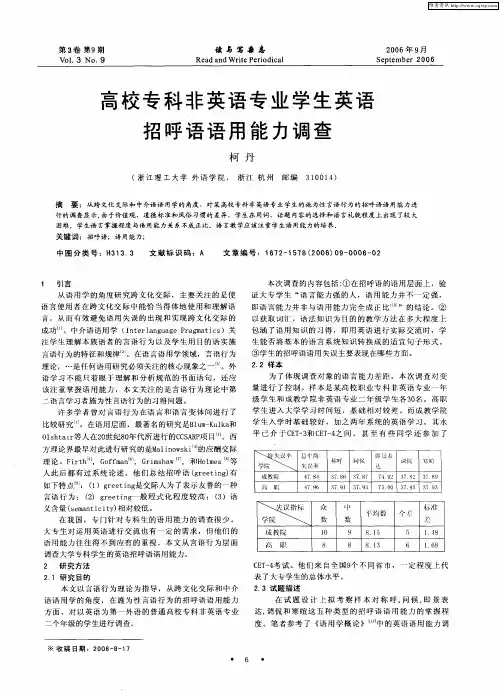
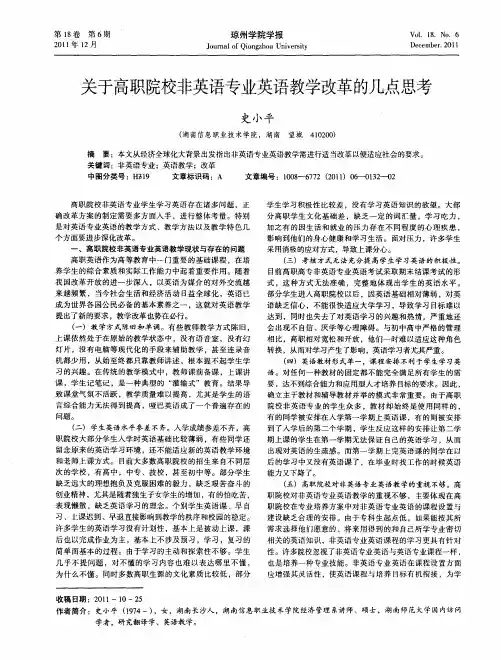
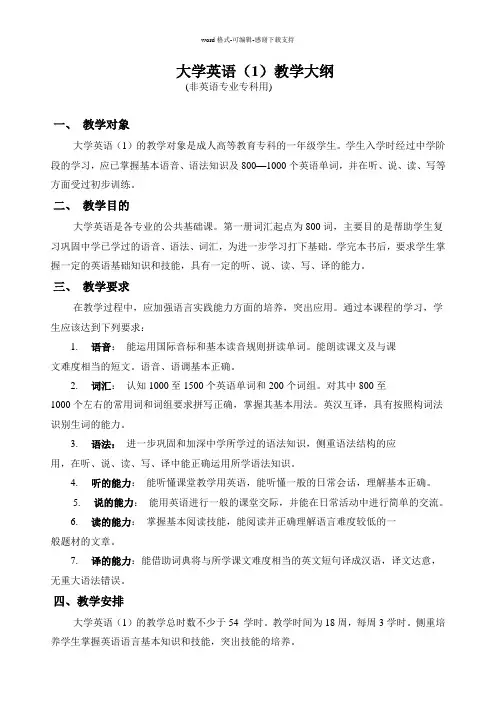
大学英语(1)教学大纲(非英语专业专科用)一、教学对象大学英语(1)的教学对象是成人高等教育专科的一年级学生。
学生入学时经过中学阶段的学习,应已掌握基本语音、语法知识及800—1000个英语单词,并在听、说、读、写等方面受过初步训练。
二、教学目的大学英语是各专业的公共基础课。
第一册词汇起点为800词,主要目的是帮助学生复习巩固中学已学过的语音、语法、词汇,为进一步学习打下基础。
学完本书后,要求学生掌握一定的英语基础知识和技能,具有一定的听、说、读、写、译的能力。
三、教学要求在教学过程中,应加强语言实践能力方面的培养,突出应用。
通过本课程的学习,学生应该达到下列要求:1.语音:能运用国际音标和基本读音规则拼读单词。
能朗读课文及与课文难度相当的短文。
语音、语调基本正确。
2.词汇:认知1000至1500个英语单词和200个词组。
对其中800至1000个左右的常用词和词组要求拼写正确,掌握其基本用法。
英汉互译,具有按照构词法识别生词的能力。
3.语法:进一步巩固和加深中学所学过的语法知识,侧重语法结构的应用,在听、说、读、写、译中能正确运用所学语法知识。
4.听的能力:能听懂课堂教学用英语,能听懂一般的日常会话,理解基本正确。
5.说的能力:能用英语进行一般的课堂交际,并能在日常活动中进行简单的交流。
6.读的能力:掌握基本阅读技能,能阅读并正确理解语言难度较低的一般题材的文章。
7.译的能力:能借助词典将与所学课文难度相当的英文短句译成汉语,译文达意,无重大语法错误。
四、教学安排大学英语(1)的教学总时数不少于54 学时。
教学时间为18周,每周3学时。
侧重培养学生掌握英语语言基本知识和技能,突出技能的培养。
五、测试测试是教学的一个重要环节,目的在于考核学生运用语言的能力。
本课程教学结束后由任课教师自行命题考试。
六、教学中要注意的几个问题1. 成人高等教育的培养目标是社会工作中的应用型专门人才。
打好语言基础是本课程的重要目标,在打好语言基础的同时,更要注重实际使用语言技能的培养。

任务型教学法在高职高专非英语专业口语教学中的应用刘晓霞(淄博师范高等专科学校)任务型教学作为一种新的教学方法,在国内外语教学界受到了一定的重视和关注。
本文介绍了任务型教学的内涵、特征、设计原则,分析了高职高专英语口语教学的现状和问题,并探讨了该模式在高职高专非英语专业口语教学中的应用。
任务任务型教学英语口语教学一、引言在英语的四种基本技能中,说的能力无疑占据极其重要的位置。
无论是在日常生活社交,还是商务英语谈判,流利的英语口语表达都可以极大地提升你的人生际遇。
人们对你的第一印象往往是看你的口语能力。
(H edge ,2000)在实际生活中,当评价一个人的语言能力时,人们往往看中的是你的说的能力而不是其它的能力。
(M c Do noug h &Sha w ,1993)然而,在高职高专英语教学中,学生的英语口语水平却徘徊不前,口语能力成为了听说读写四种技能中最为薄弱的一环。
因此,如何寻找一种积极有效的方法来改进英语口语教学,提高学生的英语口语水平已成为当前高职英语教学中急需解决的问题。
二、任务型教学的内涵、特征、任务设计的原则1.内涵。
任务型教学是20世纪80年代以来在二语习得、建构主义、交际教学法等研究成果基础上发展起来的一种新的做中学的教学理念。
任务型教学以任务为途径,以应用为动力、目的、核心,着眼于培养学生的实际语言应用能力。
这种教学方法变传统教学中的以教师为中心为以学生为中心,有助于调动学生学习的积极性,激发学习的动机,发展学生的自主学习能力、创新能力和实际语言运用能力。
2.特征。
Nunan (1991)总结了任务型语言教学的特征如下:(1)强调通过在目标语中相互交流来学习交际。
任务型教学中学生只有通过相互交流才能完成各项任务,才能提高自己的交际能力。
(2)将真实的语言文本引进到学习的环境中。
只有在真实的语言环境中,接触到真实的语言材料,学生才能真正体会,理解语言并恰如其分地运用语言,从而提升语言运用能力。
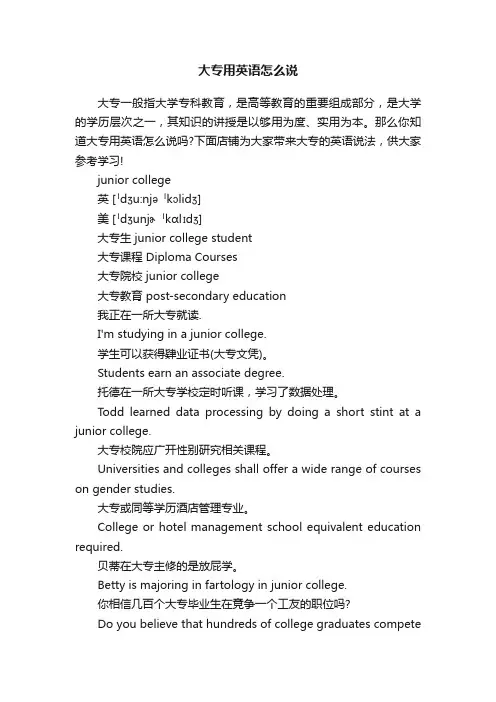
大专用英语怎么说大专一般指大学专科教育,是高等教育的重要组成部分,是大学的学历层次之一,其知识的讲授是以够用为度、实用为本。
那么你知道大专用英语怎么说吗?下面店铺为大家带来大专的英语说法,供大家参考学习!junior college英 [ˈdʒu:njəˈkɔlidʒ]美 [ˈdʒunjɚˈkɑlɪdʒ]大专生 junior college student大专课程 Diploma Courses大专院校 junior college大专教育 post-secondary education我正在一所大专就读.I'm studying in a junior college.学生可以获得肄业证书(大专文凭)。
Students earn an associate degree.托德在一所大专学校定时听课,学习了数据处理。
Todd learned data processing by doing a short stint at a junior college.大专校院应广开性别研究相关课程。
Universities and colleges shall offer a wide range of courses on gender studies.大专或同等学历酒店管理专业。
College or hotel management school equivalent education required.贝蒂在大专主修的是放屁学。
Betty is majoring in fartology in junior college.你相信几百个大专毕业生在竟争一个工友的职位吗?Do you believe that hundreds of college graduates competefor a janitor position?他从大专退学,先是当机械师,然后做了卡车司机。
He dropped out of junior college and found jobs as a machinist and then a truck driver.这所学校刚由大专升为大本。
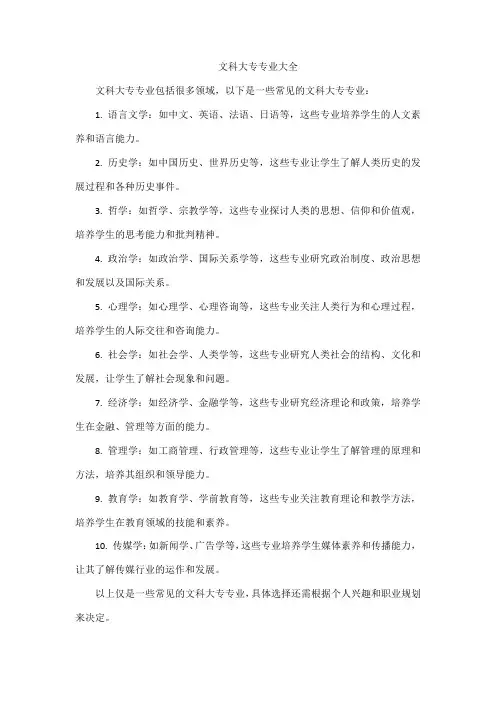
文科大专专业大全
文科大专专业包括很多领域,以下是一些常见的文科大专专业:
1. 语言文学:如中文、英语、法语、日语等,这些专业培养学生的人文素养和语言能力。
2. 历史学:如中国历史、世界历史等,这些专业让学生了解人类历史的发展过程和各种历史事件。
3. 哲学:如哲学、宗教学等,这些专业探讨人类的思想、信仰和价值观,培养学生的思考能力和批判精神。
4. 政治学:如政治学、国际关系学等,这些专业研究政治制度、政治思想和发展以及国际关系。
5. 心理学:如心理学、心理咨询等,这些专业关注人类行为和心理过程,培养学生的人际交往和咨询能力。
6. 社会学:如社会学、人类学等,这些专业研究人类社会的结构、文化和发展,让学生了解社会现象和问题。
7. 经济学:如经济学、金融学等,这些专业研究经济理论和政策,培养学生在金融、管理等方面的能力。
8. 管理学:如工商管理、行政管理等,这些专业让学生了解管理的原理和方法,培养其组织和领导能力。
9. 教育学:如教育学、学前教育等,这些专业关注教育理论和教学方法,培养学生在教育领域的技能和素养。
10. 传媒学:如新闻学、广告学等,这些专业培养学生媒体素养和传播能力,让其了解传媒行业的运作和发展。
以上仅是一些常见的文科大专专业,具体选择还需根据个人兴趣和职业规划来决定。
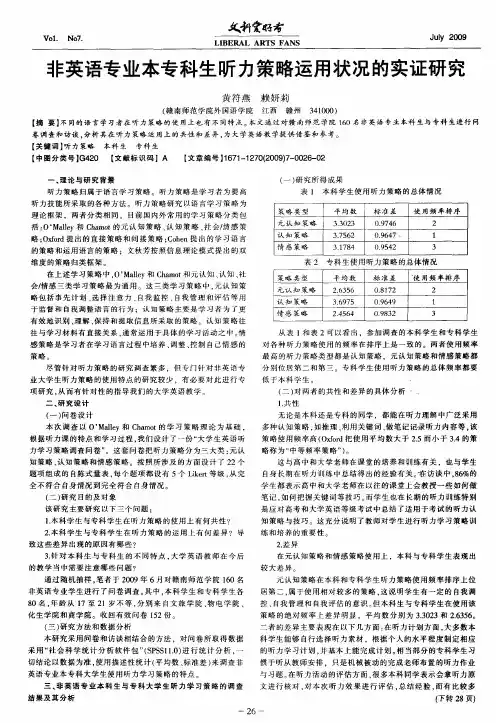
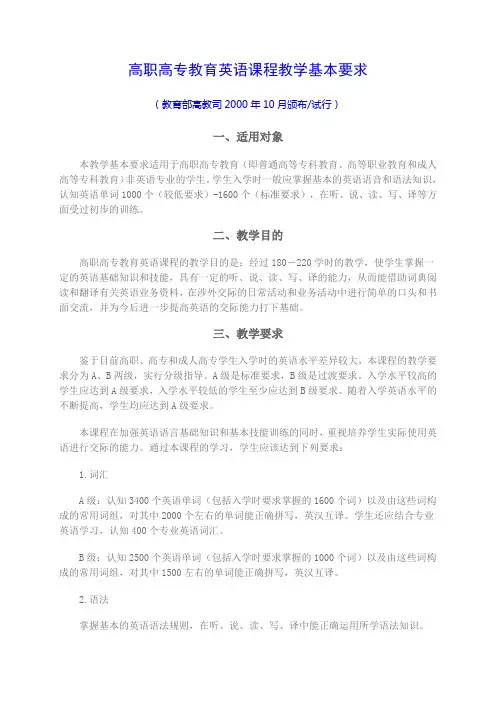
高职高专教育英语课程教学基本要求(教育部高教司2000年10月颁布/试行)一、适用对象本教学基本要求适用于高职高专教育(即普通高等专科教育、高等职业教育和成人高等专科教育)非英语专业的学生。
学生入学时一般应掌握基本的英语语音和语法知识,认知英语单词1000个(较低要求)-1600个(标准要求),在听、说、读、写、译等方面受过初步的训练。
二、教学目的高职高专教育英语课程的教学目的是:经过180-220学时的教学,使学生掌握一定的英语基础知识和技能,具有一定的听、说、读、写、译的能力,从而能借助词典阅读和翻译有关英语业务资料,在涉外交际的日常活动和业务活动中进行简单的口头和书面交流,并为今后进一步提高英语的交际能力打下基础。
三、教学要求鉴于目前高职、高专和成人高专学生入学时的英语水平差异较大,本课程的教学要求分为A、B两级,实行分级指导。
A级是标准要求,B级是过渡要求。
入学水平较高的学生应达到A级要求,入学水平较低的学生至少应达到B级要求。
随着入学英语水平的不断提高,学生均应达到A级要求。
本课程在加强英语语言基础知识和基本技能训练的同时,重视培养学生实际使用英语进行交际的能力。
通过本课程的学习,学生应该达到下列要求:1.词汇A级:认知3400个英语单词(包括入学时要求掌握的1600个词)以及由这些词构成的常用词组,对其中2000个左右的单词能正确拼写,英汉互译。
学生还应结合专业英语学习,认知400个专业英语词汇。
B级:认知2500个英语单词(包括入学时要求掌握的1000个词)以及由这些词构成的常用词组,对其中1500左右的单词能正确拼写,英汉互译。
2.语法掌握基本的英语语法规则,在听、说、读、写、译中能正确运用所学语法知识。
3.听力A级:能听懂日常和涉外业务活动中使用的结构简单、发音清楚、语速较慢(每分钟120词左右)的英语对话和不太复杂的陈述,理解基本正确。
B级:能听懂涉及日常交际的结构简单、发音清楚、语速较慢(每分钟110词左右)的英语简短对话和陈述,理解基本正确。
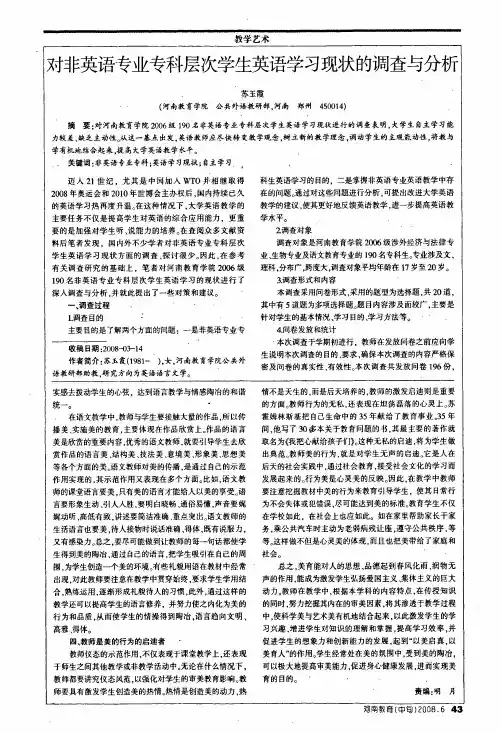
-—I——_—l—_—————I—_—I●—_————__——_—●l—●一m I一11_——————_——__-—一教学艺术对非英语专业专科层次学生英语学习现状的调查与分析竖掣:2…008-03…-14._…‘■‰…川生蒜蒜淼篆,然麓瓣鬈.,!声磬窑:苎三警11警!=-,:I兰:夏,教育学譬公共外喜美高毒品;萎甚;装疆:某裂翕;翼羞荔高善j9:。
荔1,语教研部助教.研究方向为英语语言文学。
……’…………■…’一…一……一…河南教育(中旬)2008.641.3教学艺术收回有效问卷190份。
其中有6份问卷因不符合题目要求未被采用。
笔者对所有的数据进行了统计和分类,并认真分析了调查结果。
、二、调查结果分析1.对学习英语目的的分析笔者认为,不管在任何语言的学习过程中,学习目的都占据着决定性的地位。
调查显示.44%的学生认为学习英语的目的是通过国家大学英语四、六级考试,而36%的学生认为学习英语是为了自身素质的提高。
这说明当代大学生对英语的重要性给予了更深层次的理解,他们认为学习英语不仅能提高自身的综合素质.而且可以帮助他们成为复合型人才,使他们终身受益。
另外。
以上数据也显示出学生对英语学习有很强烈的需求。
这一点无疑对学生的英语学习起到了巨大的推动作用。
2对学习英语技能的分析在大学生英语学习过程中.英语学习技能具有指导作用。
笔者通过对大学英语学习中最难的项目和他们对教师采用全英文上课的反应进行调查,发现对于非英语专业专科生来说。
听力和词汇是最难的。
因我国教育体制存在一些弊端,应试教育导致中学英语教学与大学英语教学衔接不畅.这主要反映在听力方面。
比如.河南省高考听力成绩往往只受到准备考取重点大学的高中生的重视,、不准备考重点大学的高中生就容易忽视甚至放弃对听力的训练.而在国家大学生新四级考试中。
听力却占了总成绩的35%。
这种矛盾造成了学生听力发展缓慢,学习效果不明显。
数据显示.进人大学以后。
大部分学生勉强能跟上教师的英语讲授,而2%的学生表示一点儿都听不懂。
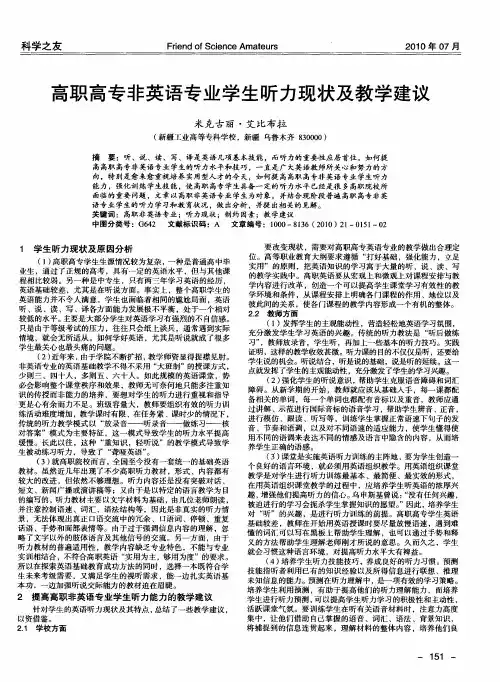
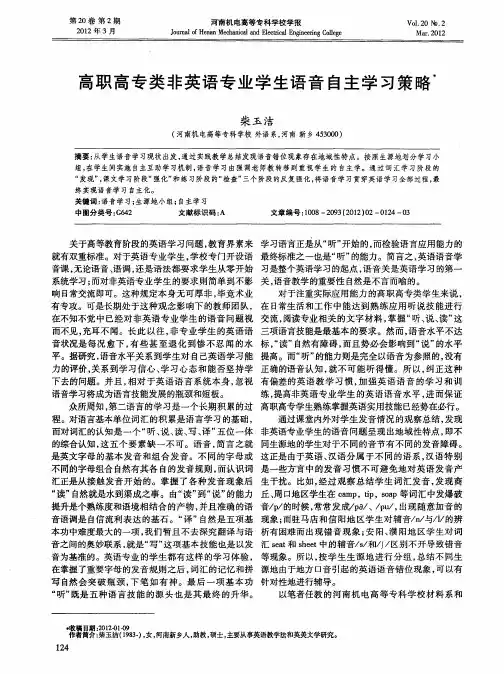
大理学院成人高等教育2012级医学类专科各专业《大学英语1》课程作业一1.课程名称:《大学英语1》2.适用专业:大理学院成人高等教育医学类专科各专业第一学期3.选用教材:《英语》(非英语专业专科用)(普通高等教育“十一五”国家级规划教材)第1册,孔庆炎主编,《英语》教材编写组编,高等教育出版社出版。
参考书:《英语学习辅导书1》(非英语专业专科用)(普通高等教育“十一五”国家级规划教材),孔庆炎主编,《英语》教材编写组编,高等教育出版社出版。
课程教学参考网站:第一部分词汇与结构 (Vocabulary and Structure Exercises)词汇与结构:阅读下面的句子,从A、B、C、D四个选项中选出一个能填入空白处的最佳选项,并在答题纸上写出所选的字母符号。
1. I was __A____ in a small countryside in China.A. brought upB. bring upC. raised upD. raise up2. These students have little _____C_ for how others look at them.A. thinkingB. thoughtC. concernD. consideration3. The foreign teachers usually have their meals at the school ___D___.A. libraryB. labC. bookshopD. canteen4. An overseas student studies __B____.A. aboardB. abroadC. at seaD. at home5. The food in the canteen is__D____.A. delightedB. detailedC. decidedD. delicious6. Chinese martial arts are ______ great interest ___B___ many foreigners.A. in … toB. of … toC. in … inD. of … in7. The morning flight is ___C___ to us as we will arrive in time to attend the afternoon meeting.A. directB. quickC. suitableD. inclusive8. Are there still tickets ___C___ on the morning flight to Shenzhen?A. freeB. suitableC. availableD. ready9. Technicians with good skills are always _D_____.A. on the demandB. on demandC. in the demandD. in demand10. Miss Yang is likely to be ___B___ for promotion.A. sentB. recommendedC. advisedD. reported11. Mr. Liu works with a travel agency as a ___B___.A. tourist guideB. tour guideC. travel guideD. trip guide12. One cannot judge a person only by his ____C__ conditions.A. economicalB. economicsC. economicD. economy13. Department stores offer a big ___B___ of items.A. kindB. varietyC. typeD. model14. They sold the old furniture to make __C____ for the new.A. a roomB. a spaceC. roomD. space15. The garment s in the department are so expensive that I can’t __C____ them.A. buyB. purchaseC. affordD. take16. They __D____ good friends and often visited each other.A. are used to beingB. are used to beC. used to beingD. used to be17. We soon arrived ______ the airport.A. inB. atC. onD. to18. After he ____D__ the unforgettable failure of love, he became afraid of it.A. feltB. forgetC. metD. experienced19. There is a ___A___ of two hours with the 7:40 train.A. delayB. changeC. scheduleD. timetable20. John is busy __B____ his girlfriend with her paper.A. to helpB. helpingC. helpD. helps21. The little girl is looking forward to ______ her father.A. seeingB. seeC. have seenD. be seeing22. The strong wind prevents the students ______ outdoor activities.A. for doingB. with goingC. into doingD. from doing23. Miss May, I am calling to ______ my appointment with Mr. Li.A. knowB. seeC. confirmD. hear24. I’m afraid he is not ______ at the moment, he is at a meeting.A. occupiedB. availableC. ableD. movable25. Mr. Zhang is on another line. May I ______ a message to her?A. leaveB. takeC. sendD. get26. Please ______ me to introduce my sister to you.A. giveB. haveC. allowD. ask27. My family will ______ to Shanghai next year.A. comeB. goC. changeD. move28. Our English Professor is very ______ in using chopsticks.A. skilledB. qualifiedC. experiencedD. good29. The monitor is ______ charge ______ the class.A. at … onB. on … ofC. in … ofD. in …on30. The little boy is ______ try to get the toy work.A. eagerlyB. necessarilyC. fluentlyD. neatly31. He has become ______ his study, so he often daydreams in class recently.A. lost inB. lost withC. bored withD. bored of32. Whenever I ______ someday ______ at the airport, I feel very sad.A see … away B. see … off C. send … away D. send … off33. When she asks him ______ help, he is always ______ to give a hand.A. to … dueB. for … dueC. to … readyD. for …ready34. I have ______ a taxi for us.A. greetedB. telephonedC. arrangedD. planned35. You can make a lot of new friends if you ______ this club.A. joinB. take part inC. enterD. come in36. The family moved into a new sunny and big ______.A. apartmentB. departmentC. compartmentD. appointment37. Many things in my house are not ______ and I’m thinking of changing them.A. in a good conditionB. in good conditionC. on a good conditionD. on good condition38. To ______ you the truth, I am crazy about shopping.A. tellB. askC. sayD. speak39. Let’s ______ the difference. Is 30 yuan O.K.?A. stopB. saveC. spareD. split40. The pictures remind me ______ the trip to the West.A. atB. onC. inD. of41. You can borrow all kinds of books from the ______.A. libraryB. classroomC. canteenD. office42. He doesn’t have much money. He is only a ______ of the company.A. mangerB. general engineerC. directorD. clerk43. Take your camera with you. We’d like to take some ______ of the beautiful park.A. paintingsB. picturesC. filesD. films44. With the help of a ______, you can work out the mathematical problem quickly.A. carB. planeC. computerD. TV set45. You should fill in the form with your name, sex, ______, and address.A. oldB. yearsC. timeD. age46. You can make a lot of new friends if you ______ this club.A. joinB. take park inC. enterD. come in47. The ______ is very helpful. She helps me to find many good books.A. employerB. memberC. monitorD. librarian48. You may borrow books with your student ______.A. bookB. formC. cardD. magazine49. The runners run very fast. Let’s cheer for ______A. themB. theyC. theirsD. their50. Our city is nice. ______ is nice, too.A. ThemB. TheyC. TheirsD. Their51. Mary is strong. Ask ______ to run the 1000_meter race, please.A. sheB. herC. hisD. hers52. Why don’t ______ try other ways to do the work?A. yourB. youC. yoursD. us53. Let’s have some coffee. Do you want ______ white or black?A. itB. itsC. it’sD. them54.His attitude toward us seems ______ .A. nicelyB. warmlyC. kindlyD. friendly55. What ______ of blood does Tom have?A. kindB. typeC. sortD. category56. The tree has many flowers on ______ .A. itB. itsC. it’sD. them57. You teach me English and I teach ______ Chinese.A. yourB. youC. yoursD. us58. Since the first landing on the moon, several man-made satellites ______ there.A. was sentB. are sentC. have been sentD. had been sent59. The shot-put record of the college ______ by our class just now.A. brokeB. has brokenC. was brokenD. had been broken60. Next year this time, a new library ______ on the campus.A. will buildB. is builtC. has been builtD. will have been built61. What kind of advice ______ to you by the old teacher?A. was givenB. will be givingC. has gaveD. is giving62. How many students ______ in that English speech competition?A. joinedB. are joinedC. have been joinedD. had joined63. Two more persons ______ from the sinking ship.A. will be savedB. are savingC. was savedD. have been saved64. Our plan ______ by the committee next week.A. was discussedB. is discussedC. have been discussedD. will be discussed65. Do you think the little boy ______ all the homework by himself?A. will be doingB. didC. has doneD. is done66. She is greatly _______ modern music.A. interested inB. interesting inC. interested withD. interesting with67. Why did you hit him ______ the back?A. toB. onC. byD. at68. If I ______ enough money next year, I will go to England.A. hadB. haveC. will haveD. am having69. Our purpose is ______ his promise.A. to make him to carry outB. to make him carry outC. make him to carry outD. make him carry out70. He walked out of the room ______ disturb me.A. in order not toB. in order to notC. so that not toD. so that to not.71. He is not in good ______ to have a long travel.A. situationB. conditionC. dictationD. environment72. I’ve a bit of headache; ______ it’s nothing serious.A. thoughB. what’s moreC. orD. and73. This country ______ traditional industries such as farming and mining.A. regards asB. depends onC. lasts forD. brings back74. There are lots of ways to increase productivity, ______ improving efficiency.A. thoughB. as suchC. such likeD. such as75. We are unable ______ any difference in the two cars.A. to seeB. of seeingC. with seeingD. seeing76. This method has been widely used, ______, it is not yet clear whether it is the best method.A. whereB. whenC. althoughD. however77. Many students find ______ jobs during their summer holidays.A. temporaryB. contextC. temperatureD. chronic78. It’s ______ to shake hands with someone you’ve just met.A. specificB. ordinaryC. specialD. natural79. Most of the Chinese people usually go to work by bike ______ when it rains.A. thoughB. althoughC. exceptD. besides80. Since you have problems ______ this question perhaps we should ask someone else.A. answeringB. answerC. to answerD. on answering81. Most of the beginning students cannot understand what Professor Marquis ______ .A. saysB. says aboutC. tellsD. speaks about82. ______ believe that some common goals should be set for all students in colleges.A. Most usB. Most of usC. We of mostD. We most83. After two weeks of computer training, the students were allowed to write programs ______ .A. himselfB. ourselvesC. themselvesD. yourselves84. The beautiful ______ house was built by the Chinese.A. two-centuries-oldB. two-century’s-oldC. two-centuriesD. two-century-old85. If you don’t get more ______ , you will get fat.A. exercisesB. exerciseC. exercisingD. exercised86. “Margaret will leave for Boston tonight.” “I think David will ______ to see her.”A. enough early arriveB. arrive enough earlyC. early enough arriveD. arrive early enough87. “What kind of suit did you buy?” “Well, I think it’s somewhat ______ yours.”A. likeB. asC. alikeD. same as88. As he was ill, he had to ______ the party.A. missB. avoidC. regretD. lack89. The doctor told him to take two pills each time and ______.A. a day three timesB. three times a dayC. three times of a dayD. a day of three times90. Most people enjoy ______ letters, but few seem to be very interested in writing them.A. readB. to have readC. readingD. to read91. The ______ of air travel during this century has made the world seem smaller.A. vacationB. connectionC. innovationD. liberation92. The road is kept open ______ the year.A. throughoutB. thoughC. thoughoutD. through93. This is the hotel ______ I met the famous actor Chen Long.A. whichB. in whichC. thatD. in that94. You can’t ______ him ______ a friend but a business associate.A. look, asB. think, asC. regard, forD. regard, as95. He is given answers that only ______ his confusion.A. add toB. come withC. add withD. come up96. He is very interested in the film, ______ I don’t like.A. thatB. whenC. whichD. how97. The bank has offered a reward for any information ______ the arrest of the man.A. causing toB. leading toC. made up toD. coming about98. I’ll call to see you this evening ______ I can stay only a few minutes.A. whichB. howeverC. evenD. though99. The business has ______ from having one office to having twelve.A. expandedB. exposedC. increasedD. comprised100. The word “weekend” did not even exist in the English language ______ about the middle of the nineteenth century.A. untilB. forC. atD. though大理学院成人高等教育2012级医学类专科各专业《大学英语1》课程作业二第二部分阅读理解阅读理解:阅读下列短文,从A、B、C、D四个选项中选出一个正确答案,并在答题纸上写出所选的字母符号。
专科英语能力a级专科英语能力A级考试是中国高等学校的一项英语考试,旨在评估非英语专业学生的英语水平。
本文将从考试内容、考试形式和备考建议三个方面对专科英语能力A级进行介绍。
一、考试内容专科英语能力A级考试主要考察考生在听力、阅读、写作和翻译四个方面的能力。
1. 听力(Listening)专科英语能力A级听力考试以选择题和填空题为主,要求考生听取录音材料后,理解并根据所听内容进行正确的选择或填空。
2. 阅读(Reading)专科英语能力A级阅读考试以选择题和判断题为主,要求考生阅读给定的文章材料后,根据文章内容进行正确的选择或判断。
3. 写作(Writing)专科英语能力A级写作考试要求考生根据给定的题目或情景,完成一篇短文写作。
主要考察考生的英语写作能力,包括语法、词汇、句型结构和篇章组织等方面。
4. 翻译(Translation)专科英语能力A级翻译考试要求考生将一篇英语短文翻译成中文,主要考察考生对英语语法和词汇的理解以及准确表达的能力。
二、考试形式专科英语能力A级考试采用计算机化考试方式进行,整个考试过程有一定的时间限制。
1. 听力考试听力考试由录音机播放,并在计算机屏幕上显示题目。
考生需在规定时间内完成听力材料的理解,并根据所听内容选择正确的答案或填写答案。
2. 阅读考试阅读考试由计算机屏幕上显示文章,并出现选择题或判断题。
考生需在规定时间内阅读材料,并选择正确答案。
3. 写作考试写作考试要求考生在规定时间内完成一篇短文写作。
考生需要注意语法和单词拼写的准确性,并注意篇章结构的合理性。
4. 翻译考试翻译考试要求考生将给定的英语短文翻译成中文。
考生需要准确理解英文原文,并运用适当的词汇和句型进行翻译。
三、备考建议备考专科英语能力A级考试需要掌握一定的考试技巧和拓展自己的英语知识。
1. 加强听力训练多听英语材料,如英语新闻、英语电视剧等,提高自己的听力水平和听取信息的能力。
2. 阅读英语文章阅读英语文章,扩充自己的英语词汇量和阅读理解能力。
自考英语1和英语2
自考英语 1 和英语 2 是高等教育自学考试中的两个英语科目,主要针对非英语专业的自考生。
英语 1 是自考专科公共课中的课程,课程学分为 7 分,课程代码为 00012。
英语 1 主要侧重于对英语基础知识的学习,包括英语语法、词汇、阅读理解和写作等方面的内容。
英语 2 是自考本科公共课中的课程,课程学分为 14 分,课程代码为 00015。
英语 2 则是在英语 1 的基础上,进一步提高学生的英语综合应用能力,包括听力、口语、阅读、写作和翻译等方面的内容。
对于自考生来说,通过英语 1 和英语 2 的考试是获得学位证书的必要条件之一。
同时,这两个科目的学习也可以提高学生的英语水平,为今后的学习和工作打下良好的基础。
总的来说,英语 1 和英语 2 是自考中非常重要的英语科目,对于自考生来说具有很高的实用价值和重要性。
如果你需要更详细的信息,建议你参考相关的自考教材或咨询当地的自考办公室。
丝路视野浅谈词块理论在非英语专业大专生英语教学中的应用党玲李慧(石家庄信息工程职业学院,河北石家庄050000)【摘要】在高等专科学院中,对于非英语专业大专生的英语教学而言,加强词块理论的应用,不仅有助于学生掌握更多的 词汇,而且还能促进学生学习成效的提升。
因而本文从词块理论的概述入手,对其应用要点进行了探讨。
【关键词】词块理论;非英语专业大专生;英语教学一、 概述所谓词块,主要是英语中很多在句子和语汇特点的语言结构,由于这些语块具有模块化的特点,所以将其称之为词块。
当大脑在处理语块之后,就能更好地对语言的内涵掌握和理解。
一般而言,词块主要有四类:(1)单词+多词的词汇,即值词+词组,虽然词组是多个词组构成,但是其不能拆卸。
(2)习惯性的搭配词汇,主要是经常搭配的单词组合。
(3)惯用类的句型,主要是这些词组的意义往往固定,例如名言警句和读语等,所以在日常使用时仍是整取。
(4)句子框架,主要是形式固定的词块,能将某一固定的意思清楚的表达出来。
二、 应用要点(一) 高等专科学院非英语专业大专生英语听力教学中 词块理论的应用在高等专科学院非英语专业大专生英语听力教学中,加强词块理论的应用,能更好地将学生在听力学习中的难度减少。
学生在听力学习过程中,能更好地掌握更多的词汇和语法知识。
这是因为文章往往是诸多词块组合而成,所以需要及时的掌握词块,才能更好地弄清文章的整体结构,促进学生听力效率的有效提升。
所以在词块理论应用过程中,教师应切实加强学生的引导,以便于学生更好的掌握这一理论下的学习方法,同时将其灵活的应用。
例如学生在听第一遍时,就需要教师引导学生主要将文章的结构词块作为听的重点,而在听第二遍时,主要是引导学生对文章的每个段落的基本意思有一个认识,最后再对听力材料所给的细节内容进行详细的了解。
而且教师在整个听力训练开展之前,就需要将新的词块告诉学生,让学生对其理解和造句,这样一来,学生就能在词块上有着一定的认识,最后在整个听的过程中利用词块的理解促进对整篇的。